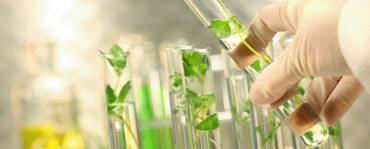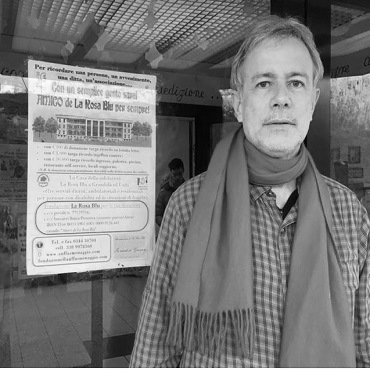
Plant Science 2019

Theme: Transforming future of Plant Science
2nd European Plant Science Conference to be held during October 18-19, 2019 in Milan, Italy. The main theme of the Conference is "Transforming Future of Plant Science" which covers a wide range of critically important sessions. Plant Science 2019 Conference aims to discover advances in plant science scientists, management and education in relation to plant disparities as well as a breadth of other topics. A plant science professional has a special set of competence and ability. Not only can they diagnose plant tissue and finally provide medication, but they also serve in leadership and consulting roles. Researchers are prominent and impact health care across the board, from reducing medical complications to improving research satisfaction. Plant Science 2019 is the best platform where you can deliberate the novel methods for all the budding scientists and researchers to present their real-time work and share their views and aspects related to the theme of the conference. This congress had especially expressed with the different topics.
Target Audience:
- Plant Science / Agricultural Students, Scientists
- Plant Science Researchers
- Plant Science Faculty
- Agricultural Universities
- Horticulture and Landscaping
- Plant and Agriculture Associations and Societies
- Business Entrepreneurs
- Training Institutes
- Seed Science and Technology
- Soil science and soil-plant nutrition
- Medicinal and Aromatic Plant Sciences
- Forest Science
- Manufacturing Agricultural Devices Companies
- R&D Laboratories
Session 1: Plant Science
Plant science includes plant biology with emphasis in the broad areas of genomics, proteomics, biochemistry (including enzymology), physiology, cell biology, development, genetics, functional plant breeding, systems biology and the interaction of plants with the environment. Plant Science ranges from developing molecular techniques for genetic engineering to ecological research in the field of plant science. Ultimately the natural products wants to contribute to fundamental knowledge of basic biological processes related to development and health and the sustainable production of more healthy foods, flowers and high-value bio-based products.
Plant Science Conference | Agriculture Conferences | Soil Science Meetings | Plant Science Event
Related Conferences:
3rd Annual Phenome 2019 Conference February 6 - 10, 2019, Arizona, USA, 9th International Symposium on Plant Science, April 1 - 4, 2019, Berlin, Germany, Plant Organ Growth Symposium 2019, April 24 - 26, 2019 Bordeaux, France, At the Forefront of Plant Research, May 6 - 8, 2019, Barcelona, Spain, Keystone Symposia: Climate Change-Linked Stress Tolerance in Plants, May 13 - 16, 2019, Hannover, Germany
Session 2: Plant Morphology
Plant morphology is all about with both the vegetative structures of plants, as well as the reproductive structures. It includes plant development, floral structure, pollination and fertilization. Plant morphology provides an overview of the science of deals with the external form of plants. Plant metabolism includes the complex of physical and chemical events of photosynthesis, respiration and the process of natural compounds. Plant respiration is biochemical process in plants whereby specific substrates are oxidation with a subsequent release of carbon dioxide.
Plant Science Conference | Agriculture Conferences | Soil Science Meetings | Plant Science Event
Related Conferences:
Functional Live Imaging of Plants Course, May 21 - 30, 2019, Nagoya, Japan, The 13th International Society of Plant Anaerobiosis Conference, June 2 - 5, 2019, Taipei, Taiwan, 2019, In Vitro Biology Meeting, June 8 - 12, 2019, Florida, USA, 30th International Conference on Arabidopsis Research, June 16 - 21, 2019, Wuhan, China
Session 3: Plant Biotechnology
Plant biotechnology is prominent in the field of medicine interfacing biotechnology and bioinformatics, the molecular characterization of medicinal plants; molecular farming; and result from chemistry, nanotechnology, pharmacology, agriculture, Biomass and biofuels as well. Plant tissue culture is the growth of plant cells outermost an intact plant. It depends on maintaining plant tissue in lab conditions on a suitable nutrient medium. The culture can be sustained as a mass of undifferentiated cells for a broad area for a period of time or regenerated into whole plants. The dissimilar techniques used in plant tissue culture. Plant tissue culture is mostly used to produce clones of a plant in a method known as micro-propagation with different stages. Plant Biotechnology is the technology which is used for getting modern product with high yield and at faster rate.
Plant Science Conference | Agriculture Conferences | Soil Science Meetings | Plant Science Event
Related Conferences:
3rd Annual Phenome 2019 Conference February 6 - 10, 2019, Arizona, USA, 9th International Symposium on Plant Science, April 1 - 4, 2019, Berlin, Germany, Plant Organ Growth Symposium 2019, April 24 - 26, 2019 Bordeaux, France, At the Forefront of Plant Research, May 6 - 8, 2019, Barcelona, Spain, Keystone Symposia: Climate Change-Linked Stress Tolerance in Plants, May 13 - 16, 2019, Hannover, Germany
Session 4: Plant Genetics and Plant Tissue Culture
Transgenes appear to be particularly sensitive to epigenetic variation which can lead to transgene silencing, i.e. the complete or partial inactivation of transgene expression. Plants are ideal model systems to study the influence of changing environmental conditions on epigenetic patterns. We are especially interested to understand how certain genomic regions become targets for epigenetic modification and how environmental stress affects epigenetic gene regulation.
Plant tissue culture is a collection of techniques used to maintain or grow plant cells, tissues or organs under sterile conditions on a nutrient culture medium of known composition.
Plant Science Conference | Agriculture Conferences | Soil Science Meetings | Plant Science Event
Related Conferences:
Functional Live Imaging of Plants Course, May 21 - 30, 2019, Nagoya, Japan, The 13th International Society of Plant Anaerobiosis Conference, June 2 - 5, 2019, Taipei, Taiwan, 2019, In Vitro Biology Meeting, June 8 - 12, 2019, Florida, USA, 30th International Conference on Arabidopsis Research, June 16 - 21, 2019, Wuhan, China
Session 5: Plant Genomics
Plant Genomics is the field of plant science focused on understanding the sequence, structure and regulation of the genome. With the advent of low cost high-throughput sequencing, investigations of the genome have become much more sophisticated in recent years. It is now possible to compare multiple genomes within a species (pan-genomes) as well as across species (comparative genomics). One of the major challenges facing the field today is developing tools to mine these massive datasets and to visualize the results of comparative studies.
Plant Science Conference | Agriculture Conferences | Soil Science Meetings | Plant Science Event
Related Conferences:
3rd Annual Phenome 2019 Conference February 6 - 10, 2019, Arizona, USA, 9th International Symposium on Plant Science, April 1 - 4, 2019, Berlin, Germany, Plant Organ Growth Symposium 2019, April 24 - 26, 2019 Bordeaux, France, At the Forefront of Plant Research, May 6 - 8, 2019, Barcelona, Spain, Keystone Symposia: Climate Change-Linked Stress Tolerance in Plants, May 13 - 16, 2019, Hannover, Germany
Session 6: Plant Breeding
Plant breeding is the technology which is used for Plant Molecular Biology to select, or in the case of genetic modification, to place particular traits into plants. Molecular breeding such as marker assisted selection and doubled haploids are immensely useful techniques. There is way that through plant breeding can also utilized by organic cultivation.
Plant Science Conference | Agriculture Conferences | Soil Science Meetings | Plant Science Event
Related Conferences:
Functional Live Imaging of Plants Course, May 21 - 30, 2019, Nagoya, Japan, The 13th International Society of Plant Anaerobiosis Conference, June 2 - 5, 2019, Taipei, Taiwan, 2019, In Vitro Biology Meeting, June 8 - 12, 2019, Florida, USA, 30th International Conference on Arabidopsis Research, June 16 - 21, 2019, Wuhan, China
Session 7: Plant Nanotechnology
The complex and different responses of plants to nanoparticles, the signal transduction mechanisms involved, and the regulation of DNA expression. Further, it showing the photosynthesis of nanoparticles, the role of nanoparticles in the antioxidant systems of botany and agriculture, the beneficial and harmful effects of nanoparticles on plants, and the application of nanoparticles and nanotubes to MS, aiming ultimately at an analysis of the metabolomics of plants. The increasing role of inventions in the field of nanotechnology is producing novel applications in the fields of biotechnology and agriculture. Nanoparticles have received much response because of the unique physico-chemical properties of these compounds. In the plant biology, nanoparticles are used as “smart” delivery systems, prompting the Nobel Prize winner P. Ehrlich support to get these compenents as “magic bullets.” Nanotechnology also play an important role in agriculture as compound fertilizers and minute-pesticides, acting as chemical delivery agents that target molecules to specific cellular organelles in plants.
Plant Science Conference | Agriculture Conferences | Soil Science Meetings | Plant Science Event
Related Conferences:
3rd Annual Phenome 2019 Conference February 6 - 10, 2019, Arizona, USA, 9th International Symposium on Plant Science, April 1 - 4, 2019, Berlin, Germany, Plant Organ Growth Symposium 2019, April 24 - 26, 2019 Bordeaux, France, At the Forefront of Plant Research, May 6 - 8, 2019, Barcelona, Spain, Keystone Symposia: Climate Change-Linked Stress Tolerance in Plants, May 13 - 16, 2019, Hannover, Germany
Session 8: Medicinal Plant Sciences
The importance of plants has been concluded by scholars since ancient period. Apart from the innumerable social benefits, much strength has been given to the plants of medicinal value. Majority of the population in developing countries assume on traditional system of medicine for their primary health care. Due to this increasing trend towards use of different system of medicine, natural medicinal plant resource in this world is under enormous pressure. Several Institution/ Organization/ Universities and Industries across the world have been steady in research and documentation of various conditions of these medicinal plants to frame a system for their preserving. In this way numerous research papers on each medicinal plant covering vast subject areas like Botany, Chemistry, Pharmacology, Pharmacy etc. are available. This will help the scientific community to keep themselves restore with the research and development work being implemented for a particular medicinal plant. This researcher will also be a source of favorable information for students, teachers, practitioners all those who are involved in their propagation etc.
Plant Science Conference | Agriculture Conferences | Soil Science Meetings | Plant Science Event
Related Conferences:
Functional Live Imaging of Plants Course, May 21 - 30, 2019, Nagoya, Japan, The 13th International Society of Plant Anaerobiosis Conference, June 2 - 5, 2019, Taipei, Taiwan, 2019, In Vitro Biology Meeting, June 8 - 12, 2019, Florida, USA, 30th International Conference on Arabidopsis Research, June 16 - 21, 2019, Wuhan, China
Session 9: Plant Nutrition and Soil Sciences
Plant nutrition and soil science is the study of the functions and dynamics of nutrients in plants, soils and ecosystems as well as of plant production processes with the goal to improve the growth of plants to increase the quality of harvest products, to improve soil fertility, to promote the recycling of nutrients, to reduce the cost of resources, to minimize fertilization - related environmental impacts.
Plant Science Conference | Agriculture Conferences | Soil Science Meetings | Plant Science Event
Related Conferences:
3rd Annual Phenome 2019 Conference February 6 - 10, 2019, Arizona, USA, 9th International Symposium on Plant Science, April 1 - 4, 2019, Berlin, Germany, Plant Organ Growth Symposium 2019, April 24 - 26, 2019 Bordeaux, France, At the Forefront of Plant Research, May 6 - 8, 2019, Barcelona, Spain, Keystone Symposia: Climate Change-Linked Stress Tolerance in Plants, May 13 - 16, 2019, Hannover, Germany
Session 10: Plant Pathology and Agricultural Science
Plant pathology is the scientific discovery of diseases in plants caused by pathogens and environmental conditions. Organisms that cause viral disease include fungi, bacteria, viruses, viroids, virus-like organisms, phytoplasma, protozoa, nematodes and dependable plants. Agriculture deals with the promotes in genetics, physiology, biochemistry, biophysics, and molecular biology. Agriculture science is related to techniques, including the application of agronomic research. Agricultural biotechnology is a specific area of agricultural science includes the use of scientific tools and techniques, including manipulation of genome, genetic markers, molecular diagnostics, vaccines, and plant biotechnology, to modify living organisms: plants, animals, and microorganisms.
Plant Science Conference | Agriculture Conferences | Soil Science Meetings | Plant Science Event
Related Conferences:
Functional Live Imaging of Plants Course, May 21 - 30, 2019, Nagoya, Japan, The 13th International Society of Plant Anaerobiosis Conference, June 2 - 5, 2019, Taipei, Taiwan, 2019, In Vitro Biology Meeting, June 8 - 12, 2019, Florida, USA, 30th International Conference on Arabidopsis Research, June 16 - 21, 2019, Wuhan, China
IMPORTANCE AND SCOPE
Plant Science Meeting 2019 is the study of the structure, function, growth and protection of plants. Plant science is divided into three major categories; they are agronomy, horticulture and forestry. Without plants, we and all other animals would not exist. We primarily depend on plants for food. They also have impact on the economy of a nation. Compared to the hundreds of plants on earth, we cultivate very few. Plant science has vibrant scope in conducting research in breeding, physiology, production, yield and management of crop. Plant science has the wide range of study field like plant morphology, plant pathology, molecular biology, plant genetics, photochemistry and many more subsequent fields.
Molecular biology is arguably one of the most important fields in biology. Plant biotechnology is leading the way in applications and will continue to bring innovations into the field. The field of plant biology is making remarkable steps forward in the use of genomics technologies to understand the mechanisms controlling many aspects of development, responses to the environment, hormone signalling, genome evolution and epigenetics. It seems that exciting times lie ahead for plant biotechnology that may lead to important applications in agriculture and other cultivation to help feed the growing global population.
Plant Science was expanded during the 1960s and 1970s as it had access to new land and unemployed labour. Between 1962 and 1983, the agricultural sector grew by 4.1% a year on average and in 1980 it employed over 70% of the working population. Yet, the state perceived developments in the agricultural sector as necessary for industrialization and exports were taxed in order to keep domestic prices low and raise revenue for state investment in other areas of the economy.
Major Plant Science Associations around the Globe
USA
- American Society of Plant Biologists (ASPB)
- Australian Society of Plant Scientists (ASPS)
- Committee of Professional Agricultural Organisations (COPA)
- General Committee for Agricultural Cooperation in the European Union (COGECA)
- Argentinean Society of Plant Physiology (SAFV)
- American Society of Agronomy (ASA)
- Brazilian Society of Plant Physiology (SBFV)
- Canadian Society of Plant Biologists (CSPB)
- Chile’s National Network of Plant Biologists (CNNPB)
- Crop Science Society of America (CSSA)
Europe
- European Association for Research on Plant Breeding (EUCARPIA)
- European Plant Science Organisation (EPSO)
- Federation of European Societies of Plant Biology (FESPB)
- European Commission on Agriculture (ECA)
- German Society for Plant Sciences (DBG)
- Scandinavian Plant Physiology Society
- European Seed Association
- UK Plant Sciences Federation
- European Crop Protection Association
- Finnish Crop Protection Association
- German Crop Protection Association
- International Society for Pest Information
- Italian Association for Plant Protection
- French Phytopathological Society (SFP)
- French Society for Phytopathology
- Hellenic Phytopathological Society
- Polish Phytopathological Society
- Portuguese Phytopathological Society
- Royal Netherlands Society of Plant Pathology
Asia
- Genetics Society of China (GSC)
- International Society of Plant Pathology (ISPP)
- Indian Society of Plant Physiology (ISPP)
- International Crop Science Society (ICSS)
- International Society for Horticultural Science (ISHS)
- Irish Plant Scientists' Association (IPSA)
- International Society for Plant Molecular Biology (ISPMB)
- Japanese Society for Plant Cell and Molecular Biology (JSPCMB)
- Japanese Society of Plant Physiologists (JSPP)
- Korean Society of Plant Biologists (KSPB)
- New Zealand Society of Plant Biologists (NZSPB)
- Crop Science Society of China (CSSC)
- Chinese Society of Plant Biology (CSPB)
- Korean Society of Plant Biologists (KSPB)
- Botanical Society of China (BSC)
- African Crop Science Society (ACSS)
- Major Plant science Universities around the Globe
Major Plant Science Universities around the Globe
USA
- University of California-Berkeley
- Humboldt State University
- North Carolina State University at Raleigh
- Miami University-Oxford
- University of California-Davis
- Purdue University
- Oregon State University
- University of Washingtons
- University of California-Riverside
- Michigan State University
Europe
- University of Cambridge, England
- University of Oxford, England
- The University of Sheffield, England
- University in Uppsala, Sweden
- University in Bern, Switzerland
- University in Uppsala, Sweden
- University in Kortrijk, Belgium
- Public university in London, England
- The Norwegian University of Life Sciences, Norway
- University in Fribourg, Switzerland
- Leiden University, Netherlands
- University of Bonn, Germany
Asia
- University of Tokyo
- National University of Singapore
- Tsinghua University
- Seoul National University
- University of Hong Kong
- National Taiwan University
- Tokyo Institute of Technology
- KAIST - Korea Advanced Institute of Science and Technology
- Osaka University
- Fudan University
- Tohoku University
- University of Science and Technology of China
- Nanjing University
- The Chinese University of Hong Kong (CUHK),
- Shanghai Jiao Tong University
- Zhejiang University
- Indian Institute of Science
Funding Agencies for Plant Science research proposal
- Fera
- EPSRC
- AHDB Horticulture
- National Information system for Sci. & Technology
- Science and Engineering Research Council
- AHDB Cereals & Oilseeds
- Natural Environment Research Council
- British Ecological Society
- Bill & Melinda Gates Foundation
- Human Frontier Science Program
Conclusion
Global demand for agriculture is increasing rapidly due to rising need to grow high-yielding crops to meet the food demand. According to a study conducted by the Intergovernmental Panel on Climate Change (IPCC) in 2016, the increased frequency of extreme weather events and global warming would adversely affect the livestock, crop, forestry, and aquaculture productivity in the years to come.
The global population is projected to surpass 9 billion by 2050 and it would be a challenge to ensure adequate crop production to meet the food demand. This would lead to new potential opportunities for crop improvement and plant science. Growing awareness about the benefits of plant culture in improving crop quality and yield is also positively impacting their domestic consumption.
References
http://www.plantsci.org.uk/funding/funding-agencies
www.universities.com/programs/plant-sciences-degrees
https://www.grandviewresearch.com/industry-analysis/plant-cell-culture-equipment-market
- Plant Science
- Plant Morphology
- Plant Biotechnology
- Plant Genetics and Plant Tissue Culture
- Plant Genomics
- Plant Breeding
- Plant Nanotechnology
- Medicinal Plant Sciences
- Plant Nutrition and Soil Sciences
- Plant Pathology, Agriculture & Horticulture
- Journal of Soil Science & Plant Health
- VEGETOS: An International Journal of Plant Research
- Journal of Plant Physiology & Pathology




































































































































